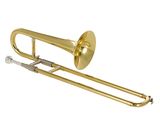Okay, so leaving aside the soprano trombone vs slide trumpet debate, what you've got here is a cheap 'mini trombone' that is... er... what it is - a cheap soprano trombone. Its small, shiny, makes the right sounds, is light and comes with a decent case.
Until you get into the more specialist trombones, they are about as basic as a brass instrument can get: a bell, a brass tube, the slide section and the mouthpiece. There's still a lot that can go wrong with that but any more basic and you'll be buying a kazoo!
The bell and tubing are all solid but, like any instrument, don't sit on it. The welds are secure throughout, the spit-key does what it should and the slides are smooth. Overall, it's well-crafted. No frills and bows, but if there was anything fancy, you'd have to wonder where they were cutting costs to keep the price down.
The only 'fault' I've found is more about taking care with maintence - the slide lock (stops the slide falling off when not playing) will jam if you don't keep it clean and oil around it. It says more about me than it does the instrument.
The mouthpiece is your basic bog-standard mouthpiece that comes with any new instrument. Not brilliant, but not as god-awful as some other cheap instruments on the market.
In terms of playability, you've got the soprano range, which puts you in the trumpet zone, which when combined with the short slide length makes it a useful tool for introducing kids to the trombone. However, if you're playing one as an adult, you need to make a few adjustments. Just make sure to move the bell section around a few more degrees to help it sit more comfortably and don't hold the slide grip with the whole finger as you would on a standard trombone - you'll be scraping your knuckles on the bell if you do.
This does pretty much what a trombone should, just in a higher range. Yes, it will take time getting used to the short spacing of each position and the tone will be different from a tenor when you're at the lower end of the range but that's why you shouldn't see it as a novelty instrument. Saxophonists will switch between upper and lower range instruments just because the tonality gives them a totally different sound. If you're a trombonist looking at getting something new into your music, this makes for a bargain way to experiment with the range of sound you can achieve.

